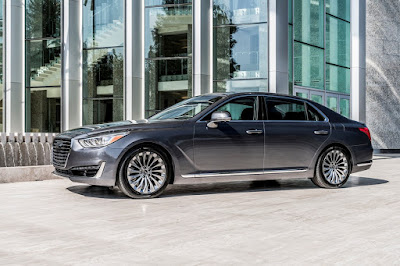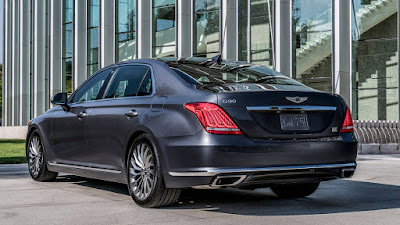Genesis G90 2018 Review, Specs, Price
Friday, October 20, 2017
Add Comment
Genesis G90 2018 Review, Specs, Price - Just launched for the 2017 model year, the 2018 Genesis G90 will likely carry over with minimal updates — we’ll update this space as soon as we have official info. The 2017 G90’s engine options include a 365-hp, 376-lb-ft of torque 3.3-liter twin-turbo V-6 engine and a 420-hp, 383-lb-ft 5.0-liter V-8 (expect both to continue for 2018). Both engines come paired to an eight-speed automatic; rear-wheel drive is standard and all-wheel drive is available. Expect these 2017 G90 features to return for 2018 including full LED headlights, a hands-free power-operated trunk, 22-way heated and ventilated power driver seat, heated and ventilated rear seats, Lexicon 17-speaker audio system, navigation on a 12.3-inch screen, and a head-up display to return to the lineup for 2018. If you’ll frequently be transferring passengers in the rear seat, opt for the available rear integrated controls on the rear center armrest, rear seat illuminated vanity mirrors, and 14-way power right rear seat and 12-way power left rear seat with an integrated memory system that will likely return. Genesis G90 2018 Review, Specs, Price.
With elegant styling and a first-class cabin, the G90 is the Genesis brand’s first attempt at a luxury sedan. Few options are offered; instead, nearly every conceivable feature is standard. Highlights include a 12.3-inch touchscreen for infotainment, adaptive dampers, a head-up display, automated emergency braking, and adaptive cruise control. Two engines are offered—a 365-hp 3.3-liter twin-turbo V-6 and a 420-hp 5.0-liter V-8—both with an eight-speed automatic and rear- or all-wheel drive.
The G90 sedan is as new as the Genesis brand it belongs to, but neither the car nor the company is entirely fresh, at least in concept. Hyundai has been dabbling in the luxury space since 2008, when it introduced the mid-size, rear-wheel-drive Genesis four-door and, later, the larger Equus. More recently, Hyundai rechristened the former as the G80, redesigned the latter into this G90, and swept them together to create the stand-alone luxury entity called Genesis. As a successor to the Equus, the megahuge G90 casts a wide net, hoping to both skim buyers away from pricier establishment players such as the Mercedes-Benz S-class, BMW 7-series, and Lexus LS and offer buyers a larger alternative to fully loaded mid-size luxury sedans for similar money. In this mission, the G90 mostly succeeds.
Genesis G90 2018 Review, Specs, Price
Price, that omnipotent purchase factor, plays a big role. The rear- or all-wheel-drive G90 sedan comes in essentially one trim level, with the lineup split by engine choice. A 365-hp 3.3-liter twin-turbocharged V-6 is standard, while a 420-hp 5.0-liter V-8 is available (and adds decadent power rear seats that adjust 12 ways on the left and 14 ways on the right). Take your pick, then decide whether you want all-wheel drive for an extra $2500, and choose from a few subdued paint choices and a tan or black interior, and you’re done.
The G90 tested here had the V-8, rear-wheel drive, and a sticker price of $70,650. The car is fully equipped, although if we were to pick nits, it’d be nice if the kingly rear thrones offered a massage function and the tiny, compact-car-size sunroof were larger. Genesis otherwise packs enough standard features into the G90’s enormous, 204.9-inch-long body to give us carpal tunnel syndrome from typing it all. Genesis G90 2018 Review, Specs, Price.
The abridged version: a self-leveling suspension, adaptive dampers, self-leveling directionally adaptive headlights, a 17-speaker Lexicon audio system, inductive smartphone charging, a head-up display, a 360-degree-view parking camera, adaptive cruise control, lane-keeping assist, blind-spot monitoring, automated emergency braking, self-latching doors, a power-operated trunk, a sunroof, supple leather upholstery, a power-adjustable steering column, three-zone automatic climate control, and heated and ventilated power seats at the four outboard positions. There are even controls that allow the driver or the right-rear passenger to scoot the front passenger seat forward for even more rear legroom.
Visually, there’s little about the G90 that suggests athleticism. Genesis’s comfort-first intention is clear from the moment you sink into its coddling 22-way power-adjustable driver’s seat (designed with input from the Aktion Gesunder Rücken, a German consortium of doctors and physical therapists that aims to prevent back pain). It continues with doors that shut with a damped refinement aided by thick seals around the aperture. Thanks partly to the 124.4-inch wheelbase and the suspension tuning, the G90’s ride is softer than a cloud sandwiched between two marshmallows. Opt for the Sport drive mode and the ride firms up only slightly. Outside of a mild tendency for the G90 to outrun its rebound damping, which allows the body one gentle bounce after large road dips, the car is otherwise planted and wheel motions are well controlled. The steering filters out the road nearly as well as the suspension does, but it is nicely weighted and tracks straight and true on the highway.
Genesis G90 2018 Review, Specs, Price
Silence seekers will love the G90’s convincing auditory impression of a bank vault with windows. We recorded a hushed 67 decibels at 70 mph, a figure that matches today’s Mercedes-Benz S550, while the car’s 37-decibel idle and 73-decibel full-throttle sound measurements beat the Benz by 3 and 2 decibels. Acoustically laminated glass in all four doors and “sound-absorbing” wheels contribute to the serenity. The car is so quiet that we figured it was simply a giant metal ingot, one that would weigh as much, but the Genesis comes in at 4647 pounds. That’s about 140 pounds less than the Mercedes S550 (although the Benz also carries a pair of turbos on its V-8) and falls directly between our long-term, rear-drive turbo-six-powered BMW 740i (4385 pounds) and an all-wheel-drive, eight-cylinder 750i we’ve tested (4883 pounds). The BMWs use carbon fiber in their structures and aluminum panels to reduce weight, but the Genesis is of conventional, all-steel construction. Genesis G90 2018 Review, Specs, Price.
Open the taps on Hyundai’s 420-hp Tau V-8, and the G90 leans back and smoothly builds speed, the muffled ripple emanating from beyond the dashboard interrupted only by the Hyundai-designed eight-speed automatic’s buttery shifts. And 60 mph comes up in 5.3 seconds, a figure that trails the large-sedan competition—even some with smaller engines and fewer cylinders. In fact, a 200-pounds-heavier, V-6–powered, all-wheel-drive G90 matched this eight-cylinder model to 60 mph, even though it has a 7-lb-ft torque deficit, thanks to its better off-the-line traction.
The V-8 begins to pull away by 70 mph, though, and thoroughly spanks the V-6 model to 120 mph, reaching the mark 2.2 seconds sooner. In everyday driving, however, the V-8 model feels heavier and more ponderous than its sharper-handling V-6–powered sibling. The all-wheel-drive V-6 G90, for example, holds a 0.02-g grip advantage on our skidpad (0.85 g to 0.83 g), stops seven feet shorter from 70 mph (172 feet compared with the V-8’s 179), and generally feels lighter on its tires. Neither model is dynamically gifted, which is why we left the Sport mode alone and instead spent the majority of our time in the standard Smart setting. Genesis G90 2018 Review, Specs, Price.
Soaking up miles was made even more pleasant sitting in the G90’s lovely interior, which combines stitched leather, soft-touch surfaces, real wood trim, and metallic elements to create a handsome if understated environment. There is a mesmerizing number of buttons on the dashboard, but all are within easy reach and impart a sense of accessibility to the G90’s myriad controls and features that is unmatched in, say, a BMW. Genesis G90 2018 Review, Specs, Price.
Even the menus in the 12.3-inch central display are intuitive and well presented, and the now luxury-car-standard control knob on the center console makes quick work of navigating the digital space. A few bits and pieces are shared with lesser Hyundais, but the G90’s key touch points are specific to this design and operate with an expensive-feeling confidence. The knurled chrome steering-wheel controls, for example, as well as the infotainment system’s knob controller, are far more rewarding to use than any switch on the Cadillac CT6’s dashboard.





0 Response to "Genesis G90 2018 Review, Specs, Price"
Post a Comment